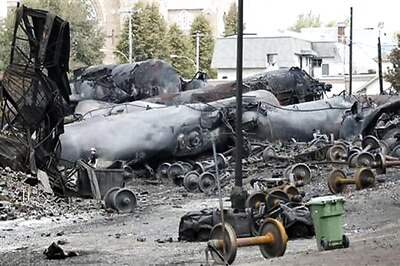
views
Washington: "Mission Accomplished" are two words President Barack Obama will not use as he winds down the most unpopular US military venture since Vietnam and declares an end to another war without victory.
Obama's visit to Fort Bragg, North Carolina, on Wednesday will be a chance to tout the completion of a troop pullout from Iraq by year-end, fulfilling a promise that helped him win the presidency in 2008 and which he hopes will help him keep it in 2012.
But even as the last American forces pack up and leave in the final days of a costly, nearly nine-year engagement, the debate over Obama's exit strategy remains as heated as ever at home - and most experts say it could be years before history delivers a clear verdict.
"War-weariness means most Americans just want to see Iraq over and done with," said Thomas Schwartz, professor of history and politics at Vanderbilt University in Nashville. "But like Vietnam, there are risks and unintended consequences that will take time to sort out."
Having inherited the Iraq war as well as the withdrawal timetable from his predecessor George W Bush, Obama is gambling that Iraq is now stable enough to deal internally with a still-dangerous insurgency and externally with any threat from neighboring Iran.
Yet to paraphrase Bush's former defense secretary, Donald Rumsfeld, unknowns - both known and unknown - abound.
Will violent Islamic radicals, never completely defeated, resurge? Will Prime Minister Nuri al-Maliki's government drift, as critics charge, toward a strong-arm model? Will Iraq's minority Kurds be satisfied with their partial autonomy?
Obama, however, has never wavered from his pledge to end a war that claimed the lives of nearly 4,500 US troops and tens of thousands of Iraqis and inflicted lasting damage to America's standing worldwide.
"It's cost us probably over $1 trillion, when all is said and done," Obama told a Virginia television station on Tuesday.
The president's critics, from Republican presidential challengers to neoconservative policy experts, contend that the timing of the US pullout is based on electoral considerations and will jeopardize gains on the ground and embolden Iran.
'Bush's war' vs 'Obama's war'
Along with the US economic downturn in 2008, Obama owes his presidency in no small measure to his opposition to the Iraq war. As an Illinois state legislator, he gave a stirring speech in 2002 warning that invading Iraq would plunge the United States into a "dumb war." Bush launched the invasion in 2003 based on claims of weapons of mass destruction and al Qaeda ties that turned out not to exist.
Obama gained momentum using his anti-war stance to distinguish himself from top Democratic rival Hillary Clinton in the 2008 presidential primaries by insisting that unlike her he never would have voted in Congress to go to war in Iraq.
He then capitalized on voters' growing disillusionment over Iraq to help him defeat Republican opponent John McCain, a leading supporter of Bush's Iraq policy.
In office, Obama moved quickly to scale back what his aides had dubbed "Bush's war" and to shift military focus to Afghanistan and its border with Pakistan, which he called the neglected battleground in the fight against al Qaeda.
Commentators now see that conflict as "Obama's war" and believe his legacy as a wartime president will rise and fall more on the outcome of the Afghanistan-Pakistan campaign than on any developments in Iraq.
With the curtain coming down on US military involvement in Iraq, Obama will use his speech to returning troops at Fort Bragg, home of the 82nd Airborne Division, to put a capstone on a war that strained America's armed forces.
He would have preferred to keep at least several thousand troops in Iraq as trainers but failed to reach a deal with the Iraq's fractious government - another source of Republican criticism of his leadership.
As of Tuesday, there were about 5,500 US troops left in Iraq, down from more than 170,000 at the height of the war.
Obama will now try to capitalize politically on the moment - even though the December 2011 deadline was actually set by Bush after he ordered a "surge" of troops that helped pull Iraq back from the brink of civil war.
But what Obama wants to avoid is the impression that he is taking a victory lap, aides say.
The White House is mindful of Bush's landing on the deck of the aircraft carrier USS Abraham Lincoln draped with a "Mission Accomplished" banner and his declaration of an end to major combat operations in May 2003. The stunt was widely ridiculed, given that the worst of Iraq's insurgency was yet to come.
'Iraq syndrome'
Obama is not the first modern-day US president faced with the risks and uncertainties of ending an unpopular war.
Richard Nixon won the presidency in 1968 saying he had a secret plan to end the war in Vietnam. He escalated the fighting before peace talks lead to a cease-fire. He withdrew combat forces in 1973, calling it "peace with honor." Winding down the war contributed to his re-election in 1972, but communist North Vietnamese forces overran the South in 1975.
Dwight Eisenhower made a campaign pledge in 1952 to break the Korean War stalemate and reached an armistice the next year - but only after thousands more US casualties and negotiations that locked in the split between North and South for decades since. Eisenhower, too, won re-election.
Analysts believe exiting Iraq will yield little benefit to Obama in a presidential campaign dominated by economic concerns - though it could help him shore up his liberal base.
The risk, however, is that sectarian warfare explodes again and Iran moves to fill any security vacuum.
"The Obama administration can ... be held accountable for the fact that the Iraq war has no meaningful end-state and no one can as yet predict its strategic aftermath," wrote Anthony Cordesman at the CSIS think-tank in Washington.
While it could be years before the full consequences of US withdrawal are clear, the lessons from Iraq have already taken root in Washington policymaking circles.
Schwartz, an expert on the Vietnam War, said that just as a "Vietnam syndrome" scarred the US military for years, discouraging major intervention without a clear goal and overwhelming force, Iraq has also transformed mind-sets.
"You've got a similar 'Iraq syndrome' coming out of this - be wary of committing ground forces, especially in the Muslim world," he said, citing as proof Obama's decision to limit the US military role in Libya earlier this year. "That's why we see precision bombing and drones as the weapons of choice."



















Comments
0 comment